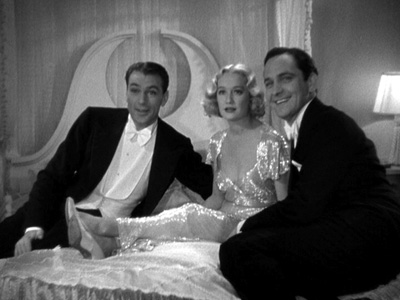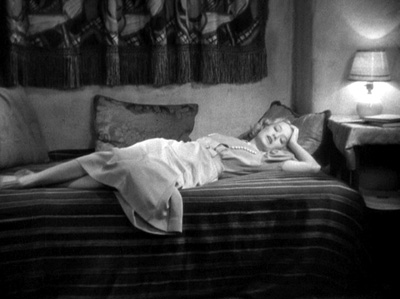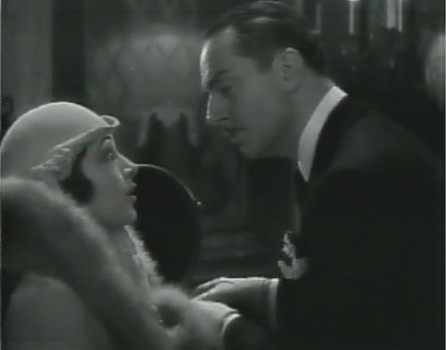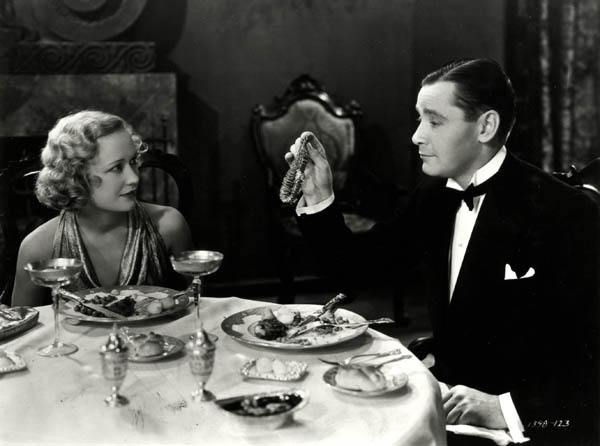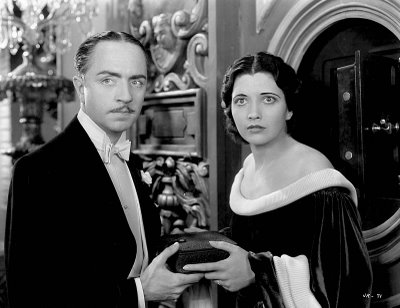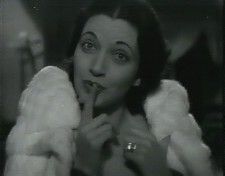As much as I admire Ernest Lubitsch as a subversive force in 30s Hollywood, especially for The Man I Killed and Trouble in Paradise, I keep coming back to a particular anti-Lubitsch argument made to me by Elaine May, of all people, the one time I was lucky enough to meet her (in Bologna the summer before last). According to her argument, if I remember it correctly, Lubitsch pretended to be more daring, free, and worldly and less middle-class than his films actually were; her main example was Heaven Can Wait, which I suspect irked her in part on feminist grounds. When I asked her if she meant that Lubitsch was roughly akin to someone like H.L. Mencken, she said, “Exactly.”
I remembered this conversation when I recently went through Criterion’s excellent two-disc edition of Lubitsch’s Design for Living (1933), including an interesting interview with Joseph McBride about the script that I saw before reseeing the feature, and William Paul’s superb analysis of both Trouble in Paradise (1932) and Design for Living, which I saw just afterwards. McBride is very good about Lubitsch’s collaboration(s) with Ben Hecht (screenwriter) and Noel Coward (playwright), and Paul is especially acute about the way the usual terms of praise heaped on Lubitsch (such as “sparkling” and “frothy”), which often relate to food and drink metaphors, are actually instruments for undermining the seriousness beneath his playfulness. (I still haven’t seen the 1964 British TV production of the Coward play on the second disc, along with Paul’s commentary, although I did watch Coward’s wonderful introduction to it. And as long as I’m name-dropping and recollecting, let me add that my very first experience of London theater was seeing Coward star in his own Suite in Three Keys in the West End not very long afterwards, during the summer of 1966.)
But I have to confess that the claims made by both critics about Lubitsch’s subversiveness was partially challenged for me just now by watching, for the first time, Jewel Robbery (1932), an amazing Warners comedy costarring William Powell and Kay Francis and directed by William Dieterle, on Turner Classic Movies shortly afterwards. Here is still another Continental comedy, only 70 minutes long, that has even more to say about the potential sexiness of jewel thievery than the sublime Trouble in Paradise — made the same year, with Kay Francis again playing a wealthy society lady wooed by a jewel thief, but in Vienna rather than Paris. (In fact, Jewel Robbery was released two months earlier, as I’ve just discovered from the invaluable online AFI catalog.) The undeserved neglect for this gem may be attributable in part to the fact that the director (Dieterle), screenwriter (Erwin Kelsey), and literary source (an East European play, as in many Lubitsch comedies — though in this case one that had already been adapted for a New York stage production the previous year) aren’t exactly auteurist calling cards.
Yet even as a statement about capitalist thievery and its underworld variants (suave and otherwise), Jewel Robbery is in some ways subtler than Trouble in Paradise, at least if one compares the upper-class stiffs and stooges in the former to the easy targets provided by Edward Everett Horton in both Lubitsch movies. I guess what I’m reconsidering now is how revolutionary it is for Miriam Hopkins, Gary Cooper, and Fredric March in Design to be rebelling against such a pathetic and pitiable cartoon, even if this entails launching an adulterous ménage a trois. (For that matter, the Horton character in Trouble is hardly any more nuanced.)
Despite all this, I yield to no one in my admiration for Trouble in Paradise, and couldn’t claim that Jewel Robbery is better in most other respects. But it may have the Lubitsch comedy trumped when it comes to sheer subversion. Perhaps part of the difference can be traced to the ideological tenor of Warners versus Paramount during this period; it’s inconceivable to me that any Paramount comedy could use the extended running gag of marijuana joints used by a jewel thief to placate and pacify cops that Jewel Robbery does. Moreover, the bittersweet fatality of Trouble in Paradise‘s conclusion — in which the two jewel thieves played by Herbert Marshall and Miriam Hopkins are reunited, leaving a woefully resigned Kay Francis in the lurch — is arguably surpassed in some ways by Kay Francis’s baroness in closeup ecstatically and even orgasmically preparing to join William Powell’s jewel thief in Nice in the final shot of the Dieterle film. [12/16/12 Postscript: Jewel Robbery is now available on DVD, as part of Volume 4 of Warners’ Forbidden Hollywood.] [12/1/11]

